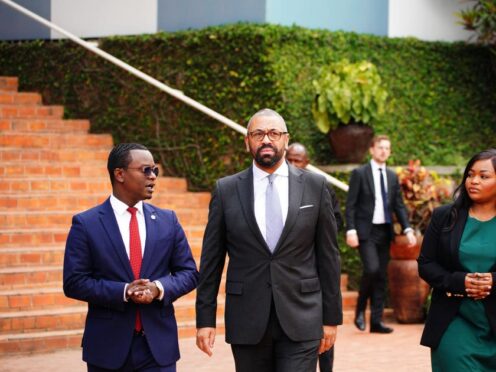
Offering failed asylum seekers £3,000 to voluntarily move to Rwanda would be a “good use of public money”, according to a Government minister.
The Home Office has confirmed it is looking at widening an existing voluntary scheme for those who have been refused asylum in Britain to include Rwanda as a destination.
Under the current terms of the “voluntary return” scheme, migrants are offered financial assistance worth up to £3,000 to leave the UK for their country of origin.
Ministers are considering extending it to include those who have no legal right to stay in the UK but cannot be returned to their home country and would consider moving to Rwanda.
It is separate from the Conservative Government’s plan to deport to the east African country those arriving via small boats in the English Channel.
Post Office minister Kevin Hollinrake told Times Radio payments for those voluntarily wanting to relocate to Kigali would amount to a “good use of public money”.
He denied the offer would undermine the stalled Rwanda deportation scheme, which is currently in the middle of a parliamentary battle.
Mr Hollinrake said: “£3,000 is a lot of money, but it costs a lot more money than that to keep people in this country who are out here without merit.
“It is about saying to people ‘If you come here, you can’t stay here if you come here illegally’.
“That is the point. So I don’t think anybody would try and come here just to get £3,000 to go to Rwanda.”
A Home Office spokesman said: “In the last year, 19,000 people were removed voluntarily from the UK and this is an important part of our efforts to tackle illegal migration.
“We are exploring voluntary relocations for those who have no right to be here, to Rwanda, who stand ready to accept people who wish to rebuild their lives and cannot stay in the UK.

“This is in addition to our Safety of Rwanda Bill and Treaty which, when passed, will ensure people who come to the UK illegally are removed to Rwanda.”
The Government believes the voluntary scheme, which was first reported by The Times, can be brought into effect quickly because it will draw on existing structures outlined by the agreement already in place with Rwanda and existing voluntary returns processes, it is understood.
Labour accused ministers of “resorting to paying people” to go Rwanda upon realising their deportation scheme “has no chance of succeeding”.
Shadow immigration minister Stephen Kinnock said: “It seems that the Home Secretary is trying to find a way out of this hare-brained scheme that he himself has described as ‘batshit’.”
It comes as Prime Minister Rishi Sunak’s legislation to revive the grounded plan to deport some asylum seekers to Kigali heads back to the Commons where the Government will seek to overturn a string of amendments agreed by the Lords.
The Safety of Rwanda (Asylum and Immigration) Bill, which suffered 10 defeats in the unelected chamber, received an unopposed third reading – although critics made clear their reservations about the “stinker” legislation.
Changes backed by the Lords include overturning the Government’s bid to oust the courts from the process.
The move effectively blows a hole in the Bill, which is intended to prevent continued legal challenges to the stalled deportation scheme after the Supreme Court ruled the plan was unlawful.

The proposed legislation seeks to compel judges to regard Rwanda as safe in a bid to clear the way to send asylum seekers who cross the Channel in small boats on a one-way flight to the east African country.
But the amendment agreed by peers restores the jurisdiction of domestic courts in relation to the safety of Rwanda and enables them to intervene.
The changes set the stage for an extended stand-off between the Commons and Lords during “ping-pong”, where legislation is batted between the two Houses until agreement is reached.
The Commons will get a chance to debate and vote on the amendments on March 18.
The Prime Minister had previously warned the Lords against frustrating “the will of the people” by hampering the passage of the Bill, which has already been approved by MPs.
Mr Sunak has defended the stalled plan to send migrants to Rwanda as a “worthwhile investment”, despite the public spending watchdog revealing the cost of the policy could soar to half a billion pounds.
The scheme, which is yet to see a flight take off after a series of legal setbacks, could cost taxpayers nearly £2 million for each of the first 300 asylum seekers sent to Kigali, according to the National Audit Office.

Enjoy the convenience of having The Sunday Post delivered as a digital ePaper straight to your smartphone, tablet or computer.
Subscribe for only £5.49 a month and enjoy all the benefits of the printed paper as a digital replica.
Subscribe